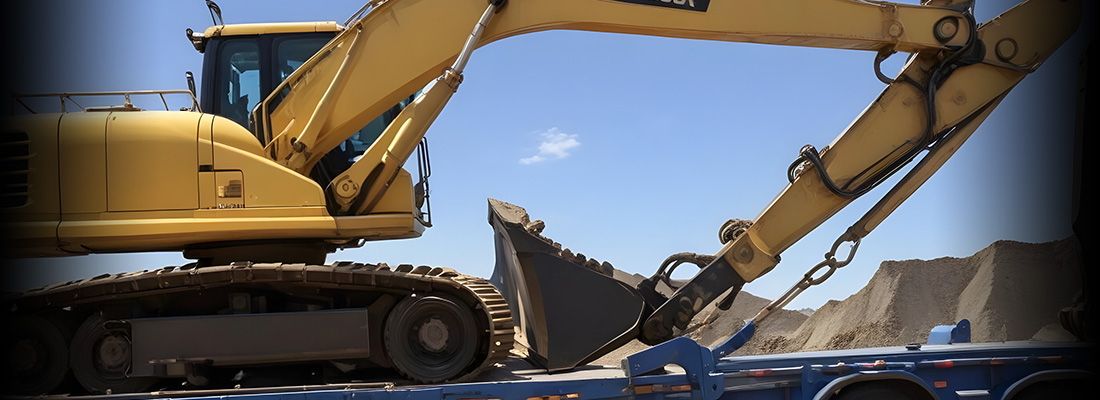

| PREVIOUS | HOME | NEXT |
Appeal dismissed on bridge damage liability
By Resolve Editor Kate Tilley
The Full Federal Court has dismissed an insurer’s appeal against liability for damage that occurred when a prime mover carrying an excavator hit a bridge.
The incident occurred on 19 May 2021when Kerembla Pty Ltd, which specialises in mineral exploration drilling services for the coal mining industry, moved the excavator onto a prime mover and trailer to take it from a Hunter Valley Operations Pty Ltd (HVO) mine site to Kerembla’s depot in Muswellbrook, NSW.
The prime mover, trailer and boom arm could safety transport the excavator under a height of 4.3m. Kerembla employees reviewed their company’s safe work method statements for various tasks, including loading the excavator, and moved it onto the trailer and secured it with chains.
The employees used a tape measure to measure the height of the excavator on the trailer and wrongly believed it was less than 4.3m. At the first bridge, with a 5m clearance, they stopped to check the height and considered they had a 600mm clearance. The next bridge had signage saying 4.9m. As they travelled under it, the excavator struck the bridge, causing damage.
PPL policy
Bridge owner HVO claimed against Kerembla, which lodged a claim with Brooklyn Underwriting and its security provider XL Insurance on its public and products liability policy.
XL denied the claim on the basis of an exclusion clause.
At the Federal Court trial, Justice Ian Jackman said: “The insuring clause and any exclusion clause must be read together in a harmonious way so that due effect is given to both, and the right conferred by the former is not negated or rendered nugatory by the construction adopted for the latter; in relation to the construction of exclusion clauses, such a clause is to be construed according to its ordinary and natural meaning, read in the light of the contract as a whole.”
XL sought to rely on the policy’s exclusion clause 3.22 which excluded damage caused by registered vehicles, but Kerembla argued that two subclauses of 3.22 provided writeback for:
- a vehicle (including any tool, implement, machinery or plant forming part of or attached to or used in connection with such vehicle) while being operated or used by you or on your behalf as a tool of trade at your premises or on any worksite, and
- loading or unloading of any vehicle.
Worksite defined
Justice Jackman found the public road where the incident occurred, which was the most direct route between HVO’s mine site and Kerembla’s depot, was part of the worksite. He also found the excavator was “a tool, implement, machinery or plant which was attached to the trailer and towed by the prime mover at the time of the incident”.
He said the words in the subclause “have the effect that any tool, implement, machinery or plant attached to a vehicle is itself part of the vehicle. It would make a nonsense of that aspect of subclause 3.22(d) if the machinery attached to the vehicle fell outside [the subclause] because the vehicle was used to carry the machinery, which is a kind of good”. The tool of trade definition was therefore satisfied.
He said the subclause on loading and unloading was not applicable because the damage did not occur during loading.
On appeal, Justices Michael Lee, Angus Stewart and Elizabeth Cheeseman agreed with Justice Jackman. They summarised XL’s five grounds for appeal as:
(1) the insured risk is damage to property arising out of the use of a vehicle required to be registered or have compulsory insurance and the writeback does not apply to the prime mover and trailer in the circumstances giving rise to the claim (use contention),
(2) the definition of tool of trade requires that the tool must not be travelling to or from a worksite and must not be a vehicle used to carry goods to or from any premises (tool of trade contention), and
(3) the definition of worksite could not properly be understood to include the road where the incident took place (worksite contention).
Argument rejected
On the use contention, the judges said: “In construing the exclusion clause (including the writeback) according to its ordinary and natural meaning, read in the light of the policy as a whole, there is nothing discordant or apparently uncommercial about the writeback applying generally to vehicles as defined.”
They rejected XL’s argument the “object” of the writeback was only the excavator, not the prime mover and trailer.
On the tool of trade contention, they agreed the prime mover and trailer were tools of trade and the primary judge’s adopted construction of the subclause was “not only far from commercially absurd but preferable”.
On the worksite contention, Justices Lee, Stewart and Cheeseman agreed with Justice Jackman, saying: “While a vehicle is travelling on a work journey from a work premises to a work site, it is always on a worksite. The fact that the work journey involved the use of a public road … is neither here nor there.”
XL Insurance Co SE, trading as Brooklyn Underwriting v Kerembla Pty Ltd [2023] FCAFC 183 (23 November 2023)
Kerembla Pty Ltd v XL Insurance Company SE, trading as Brooklyn Underwriting [2023] FCA 769 (7 July 2023)
Resolve is the official publication of the Australian Insurance Law Association and
the New Zealand Insurance Law Association.

